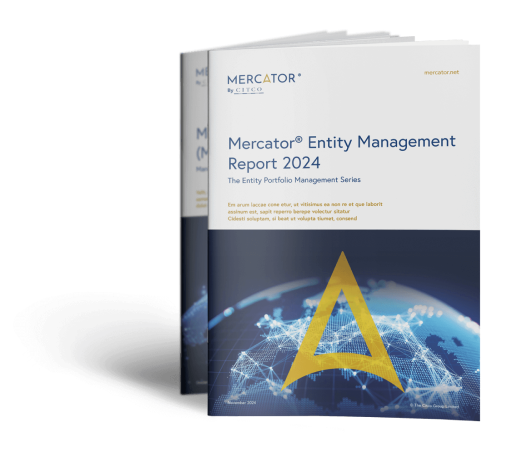The information contained in this document is marketing material and for informational purposes only. The information contained in this document is presented without any warranty or representation as to its accuracy or completeness and all implied representations or warranties of any kind are hereby disclaimed. Recipients of this document, whether clients or otherwise, should not act or refrain from acting on the basis of any information included in this document without seeking appropriate professional advice. The provision of the information contained in this document does not establish any express or implied duty or obligation between Citco and any recipient and neither Citco nor any of its shareholders, members, directors, principals or personnel shall be responsible or liable for results arising from the use or reliance of the information contained in this document including, without limitation, any loss (whether direct, indirect, in contract, tort or otherwise) arising from any decision made or action taken by any party in reliance upon the information contained in this document. © The Citco Group Limited, December 2024.
Compliance Health Checks: The Who, What, Why and When
In today’s complex regulatory landscape, multinational organizations face increasing pressure to maintain compliance with a myriad of laws and regulations. Compliance Health Checks have emerged as a crucial tool for global organizations to ensure adherence to regulatory requirements and mitigate potential risks.
A Compliance Health Check is a comprehensive process that evaluates a company’s compliance status against the legal and regulatory framework under which it operates. This assessment includes a detailed review of internal records and filings made with regulatory agencies, identifying gaps in the existing compliance structure and recommending corrective actions to minimize risk and establish a strong foundation for compliance.
At Mercator® by Citco (Mercator), we understand just how important these checks are for our multinational clients. We conduct Compliance Health Checks during onboarding to ensure clients are well-equipped to meet both current and future regulatory requirements across all their operating jurisdictions. This proactive approach sets the foundation for robust compliance management.
Who: Key Stakeholders in Compliance Health Checks
A Compliance Health Check process involves various stakeholders within multinational companies. These may include:
- Global Compliance Officers: Oversee the entire process, ensuring consistency across regions.
- Regional Legal and Compliance Teams: Offer jurisdiction-specific expertise.
- C-Suite Executives: Set the tone for global compliance culture and approve necessary changes.
- Business Unit Leaders: Provide insights into operational challenges across different markets.
- Local Entity Directors: Offer knowledge of in-country operations and compliance requirements.
- Corporate Secretaries: Assist in reviewing and updating corporate documentation.
- Finance Teams: Provide financial data relevant to compliance matters.
- Internal Audit Teams: Assess the effectiveness of existing compliance controls.
- IT and Data Protection Officers: Provide input on technology-related compliance issues.
What: Essential Components of a Compliance Health Check
A thorough compliance health check typically includes:
- Cross-Border Regulatory Mapping: Identifying applicable regulations across all operating jurisdictions.
- Global Registry Examination: Scrutinizing company information registered with respective country commercial registries.
- Corporate Document Review: Reviewing key corporate documents to identify compliance status and ensure consistency with global standards.
- Global Policy Harmonization: Ensuring consistency in compliance policies while accommodating local variations.
- Global Reporting Mechanisms: Assessing the efficiency of cross-border reporting systems.
- Regulatory Requirements Overview: Providing a comprehensive summary of key regulatory requirements applicable across all jurisdictions.
- Compliance Status Assessment: Evaluating whether the company follows respective requirements and regulations in each jurisdiction, taking into account all the above components.
A detailed findings report is then compiled, identifying areas of non-compliance, proposing remedial actions requiring immediate attention, and outlining an action plan to address identified issues.
Why: The Importance of Compliance Health Checks
Compliance health checks offer several critical benefits:
- Global Risk Mitigation: They help identify potential compliance gaps across jurisdictions, before they lead to violations or penalties.
- Operational Efficiency: By streamlining processes and ensuring uniform compliance standards, health checks can improve overall efficiency.
- Reputation Protection: Demonstrating a commitment to proactive compliance can enhance stakeholder trust and protect the organization’s reputation.
- Adaptability to Regulatory Changes: Regular checks help organizations stay ahead of evolving regulatory requirements.
- Cost Savings: Early detection of issues can prevent costly fines and legal issues.
- Continuous Improvement: Health checks provide opportunities for ongoing enhancement of compliance programs to meet international best practices.
When: Timing and Frequency for Multinational Companies
While the ideal frequency may vary depending on the organization’s size, industry, and risk profile, there are several key times when compliance health checks should be considered:
- Annual Global Assessments: Some organizations conduct yearly comprehensive reviews as a baseline.
- Before Major Corporate Events: Mergers, acquisitions, or initial public offerings often necessitate thorough compliance reviews.
- Following Significant Regulatory Changes: When significant international laws or impactful regulatory shifts come into effect.
- After Global Corporate Restructuring: When changes affect multiple regions or subsidiaries.
- In Response to Incidents: Compliance breaches or near-misses should trigger immediate reviews.
- During Periods of Rapid Growth: Expanding into new markets may introduce new compliance challenges.
Conclusion
In today’s complex global regulatory landscape, compliance health checks are essential for multinational companies. These checks enable organizations to mitigate risks, improve efficiency, and foster a culture of global compliance. Regular assessments help protect against risks, enhance operational efficiency, and build stakeholder trust.
At Mercator we’re committed to guiding our clients through the intricate world of regulatory compliance. Our tailored approach to Compliance Health Checks and deep industry expertise ensure that organizations are well-prepared for current and future regulatory challenges.
To learn more about Mercator’s Compliance Health Check services, please contact us at mercator@citco.com.
Lina Stewart
Senior Legal Team Manager, Mercator by Citco, Citco Mercator, UAB

